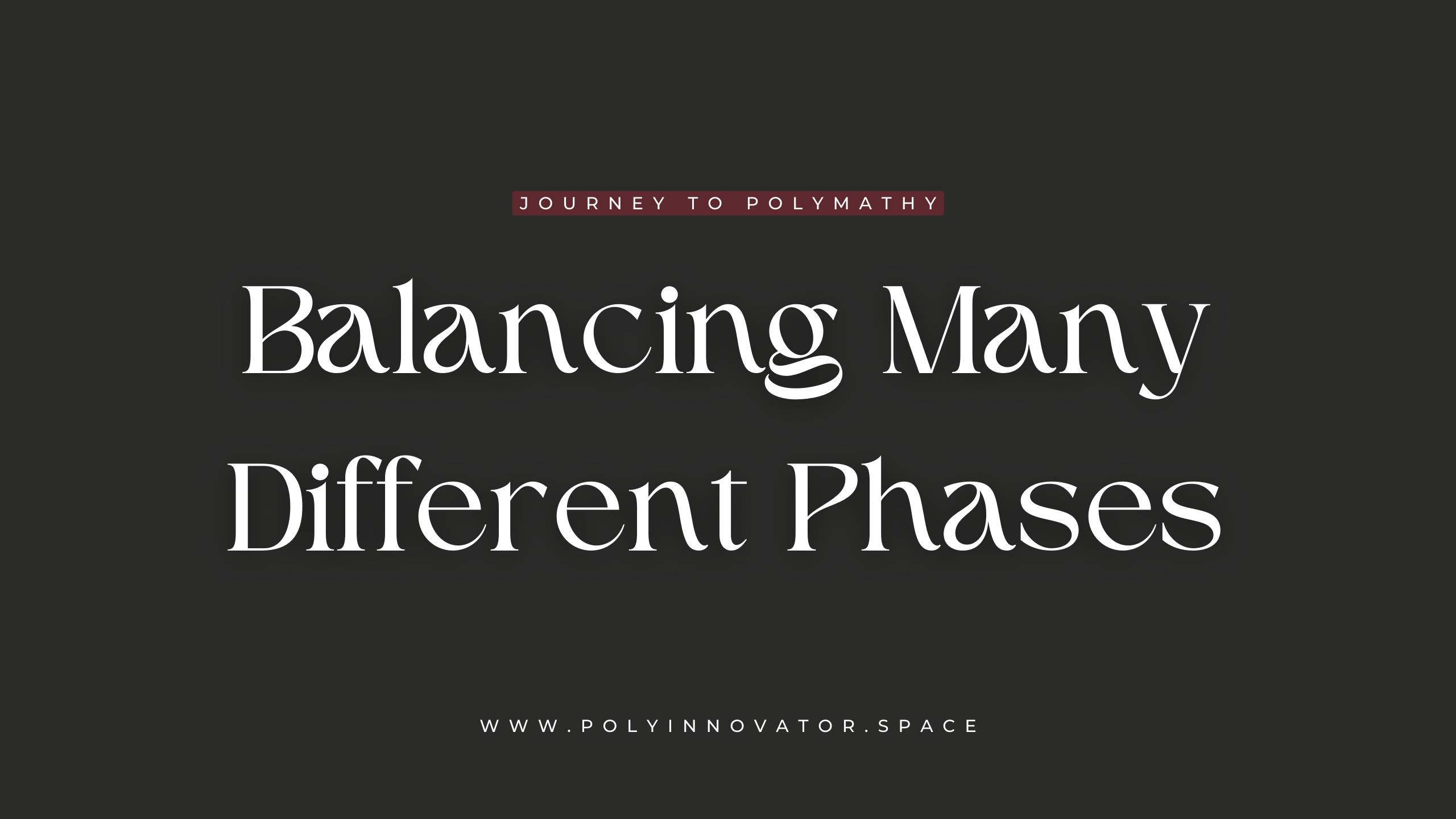I needed to write about this for a few reasons. I need to distill what is in my head when it comes to scheduling things for multiple phases at once, and I tried using ChatGPT to help. Although it didn't really give me much, and so a Fireside Codex it is then.
While this sort of fits into the "Journey to Polymathy" newsletter topic, this is just a personal thought train really.
When it comes to calculating the time needed for each endeavor I came up with this equation:
Time x Energy x # of Phases = Result
It isn't as simple as Time Management
If it was then I'd be off to the races because I have spent so much of my adult life managing my time and calendar. I live off my Gcal, and plan everything around what is on it.
I've even tried timeblocking, and I'm trying that more and more, as possible.
Every day you have a certain amount of energy. This is something I've told my personal training clients, as you never know what level someone is going to come in with when training them.
I told them how I think about this, and how I improvise the workout based on that factor. If it is a sunny day and they're all giddy, they're going to have more energy to workout.
Conversely, if they had a long day at work/school, and don't have the patience for anything. Their workout is going to suffer. They still have to do it, but as their trainer I can optimize to work the best way possible.
This goes for each and every one of us, and we need to account for this change each day.
Energy Allocation and "Having Enough Spoons"
You have only so much energy every day, and how you choose to spend it will determine your results in life. Whether that is good or bad is up to you, and you can't make excuses based on external factors. You are in control of your life.
Let me make a side note here, and there are some people who have intrinsic factors that change the amount of energy they have. Spoon theory does a good job explaining this.
According to spoon theory, people without a disability or chronic health condition wake with enough spoons to tackle the expectations of their day. They can tend to their body, home, job or studies, and social plans and not worry that they'll run out of energy.
-Source
Basically you start out with enough Spoons in the morning, and if you are a person with a disability or chronic health condition; Then on some days, if not a lot of them, you'll end up LACKING a sufficient amount of spoons to take on your day.
Tim Ferriss also says something similar when it comes to energy, as he refers to them as "Attention Units". You only start out with a certain amount, and every task you do in the day takes away from those AU's.

I bring it up because regardless if you are a Spoonie or someone without those ailments; The thing I want to drive home here is that EVERY DAY IS DIFFERENT.
It may be way more prudent if you are a Spoonie, and I wanted people reading who may be one to be aware of that concept. As I felt it would be helpful.
Additionally, it is a great way to explain energy allocation to everyone else too, as they may not be as 'mindful' about it.
Juggling MANY different things
Then we add the polymathy/multidisciplinary aspect to all of this, and it complicates things further.
People with the fascination of many different topics find themselves splitting between many different endeavors. That causes a lack of time management for some, or what the specialists call a "lack of focus". In reality it is more of interleaving between disciplines, rather than changing focus for the sake of changing. However there are some multipotentialites out there that could use a better system.
Hence why I create the content that I do, it isn't the idea that what they are doing is wrong. I say they, but I'm in this boat too. Just that we could switch things around in some ways, and in the end the result will come out better.
Accommodating for our circadian rhythms, maximizing our time spent on certain tasks, making sure to wait to switch to another one until some sort of progress has been made, and using proper rewards to mark milestones.
Using our own neurochemistry on ourselves, and tricking our brains into doing what we need them to do.
Putting the Equation into Practice
Time
We sleep anywhere from 6-9 hours a day, depending on your needs, and we need to eat for some of that day as well. 1-3 meals a day, which means anywhere from 30 minutes to 3 hours used up by consumption.
Let's go on the average and say: 10 hours used up by bodily needs, which means we have only 14 hours left (maybe 16 if you're pushing it) to do everything else.
You'll most likely have a job or school that takes up most of your day. Although perhaps you can squeeze in progress in some areas throughout your day. I.e. doing small exercise breaks, or using your study hall to work on projects.
TIMES
Energy
The factor of energy. Did you get enough sleep? Eat and adequate breakfast/lunch? Is it the right kind of weather (which has a profound impact on your mind)? Did you wake up with less Spoons or Attention Units today?
All of these go into your calculation of how much energy you'll have in the day.
While you may not sit there and actually calculate how much it really is, there still can be some thought process involved. Perhaps a quick meditation on how you are in that VERY MOMENT.
Relying on caffeine and supplements is not a healthy way to live, and I truly need to wane my consumption of Caff.
TIMES
Endeavors
The whole reason why I made this post today, as to balance out what is going on in my head. I have my 2-3 newsletters, gaming videos, PolyCast, weekly posts, PolyInContent, jobs, exercise, and the game I so desperately want to make progress on.
All of this at once, and it is hard to think about how I don't need to do all of it in one day. Spread it out over the week, but if I have a lower energy day earlier in the week. Then the tasks drip out to later days in the week, and this week in particular I have a lot of my job work to do.
Allocating time, and more importantly STICKING to that timeslot to maximize efficiency.
All in all, I don't know what he answer is, and I don't know what that calculation results are. I tried figuring it out, and if you have any ideas please let me know. Cheers.
![Official Website for Dustin Miller PolyInnovator [LLC]](https://www.polyinnovator.space/content/images/2025/03/polyinnovator-logo-2024.png)












